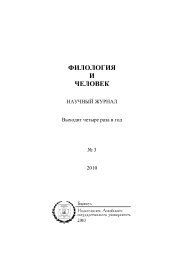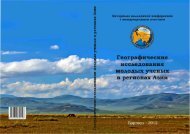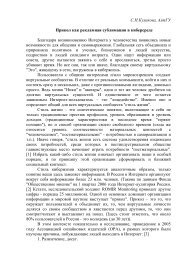Erasmus Mundus Action 1 Compendium 2009 - EACEA - Europa
Erasmus Mundus Action 1 Compendium 2009 - EACEA - Europa
Erasmus Mundus Action 1 Compendium 2009 - EACEA - Europa
You also want an ePaper? Increase the reach of your titles
YUMPU automatically turns print PDFs into web optimized ePapers that Google loves.
<strong>Erasmus</strong> <strong>Mundus</strong> Masters Courses<br />
MSCM<br />
Master of Science in Computational Mechanics<br />
Duration: 2 years<br />
Course description:<br />
This full-time programme is offered by: Universitat Politècnica de Catalunya (Barcelona, Spain),<br />
Swansea University (United Kingdom), École Centrale de Nantes (Nantes, France) and Universität<br />
Stuttgart (Stuttgart, Germany). These institutions have a longstanding tradition in Computational<br />
Mechanics.<br />
Objectives:<br />
The Master is designed for students who wish to develop their knowledge and competency in the field<br />
of computational mechanics with applications in solids, fluids and interdisciplinary fields. The goal is to<br />
provide the students with the skills for the modelling, formulation, analysis and implementation of<br />
simulation tools for advanced engineering problems, as well as skills for understanding these<br />
approaches in the broader context of engineering science. Students may take the Master as a<br />
professional terminal degree, or in preparation for a Ph.D. degree.<br />
Duration and mobility:<br />
The Master’s programme consists of 120ECTS (two academic years). Students attend two institutions:<br />
the first institution (either Barcelona or Swansea) is responsible for teaching 35ECTS and the second<br />
institution, different from the first one (Stuttgart, Nantes, Barcelona or Swansea), the remaining<br />
85ECTS. It is organized in four terms.<br />
Summary of study programme:<br />
The first term is aimed at providing a solid background on mechanics and numerical methods. It<br />
consists of a set of core modules completed by elective modules. These core modules are taught<br />
jointly at Barcelona and Swansea (same syllabus and exams). The second term consists of a minor<br />
aimed at providing a more in-depth knowledge in a selected area. The third and fourth terms include<br />
Practical Training in industry or an applied research centre and a Master’s Thesis.<br />
Complementary information:<br />
Students are distributed evenly between partners, the entire Master Programme is taught in English.<br />
See all details as well as admission requirements and degrees awarded at the master's website.<br />
Website: www.cimne.com/cm-master/<br />
Partners:<br />
Technical University of Catalonia, Spain (Co-ordinating institution)<br />
University of Stuttgart, Germany<br />
Ecole Centrale de Nantes, France<br />
Swansea University, United Kingdom<br />
Contact:<br />
Pedro Diez<br />
UNIVERSITAT POLITECNICA DE CATALUNYA<br />
DEPARTAMENT DE MATEMATICA APLICADA III<br />
Jordi Girona, 31 - Edifici C2<br />
08034 BARCELONA - SPAIN<br />
pedro.diez@upc.es<br />
117






